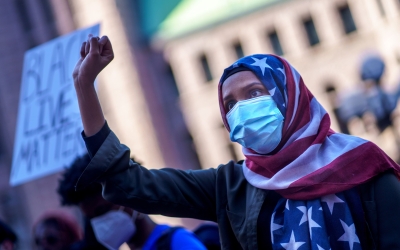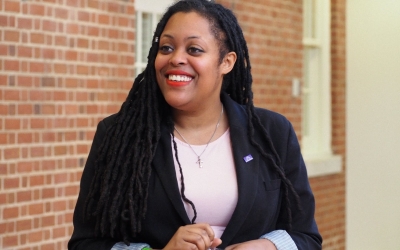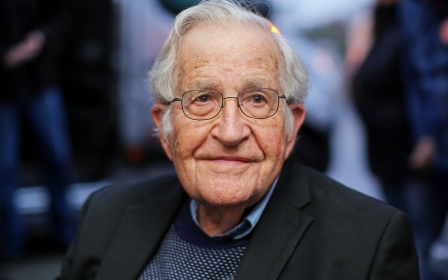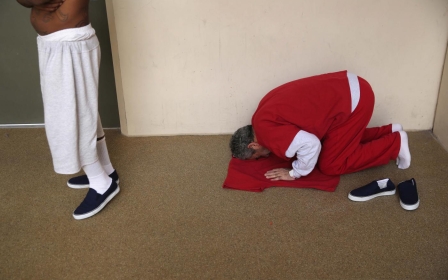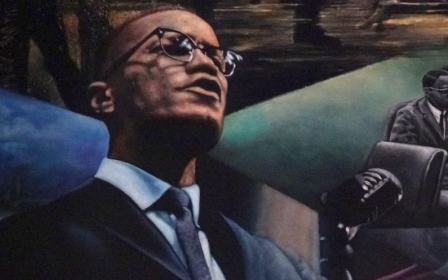Arab-Black relations: Floyd tragedy highlights ties and tensions
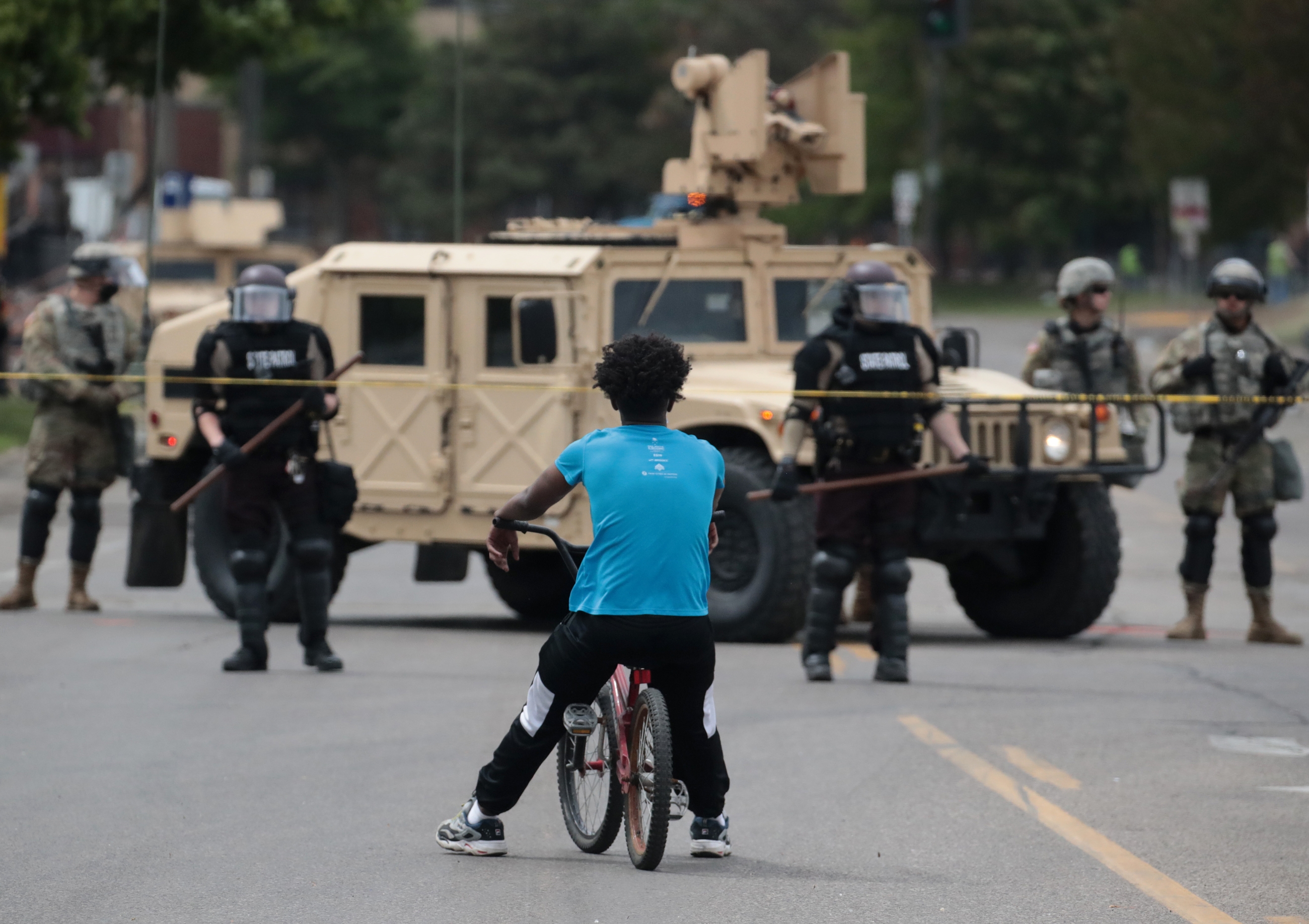
"Please, please, I can't breathe," George Floyd pleaded, gasping for air as a police officer's knee pressed into his neck for several minutes until his life was lost.
Floyd's death in Minneapolis on Monday has touched the conscience of America, renewing the trauma of centuries of racial injustice and police brutality against African Americans and sparking furious protests in Minnesota and across the country.
As demonstrators set ablaze a police precinct building in Minneapolis on Thursday night, a debate emerged within US Arab communities about solidarity with African Americans and the responsibilities of immigrant-owned businesses in predominantly Black neighbourhoods.
The police were arresting Floyd in response to a call by an Arab American-owned store, whose employees suspected that the 46-year-old customer was trying to pass them a counterfeit $20 bill.
The store owners have unequivocally condemned the killing, stressing that they support the Black Lives Matter movement.
'We know the lack of value given to Black lives by the system'
- Ahmad Abuznaid, Palestinian-American organiser
Details of the interactions inside the store are still hazy, and it is not clear who exactly at the business called the police, but some activists are urging caution in general before contacting the authorities when people of colour are involved.
Palestinian-American community organiser Ahmad Abuznaid said the tragic incident is a "teachable moment" for Arab-owned businesses.
"What we have to deal with at this point is the facts - and the facts are that African Americans have been disproportionately brutalised by police forces in the United States of America historically and in modern times, and we need to be sensitive to these realities," he told Middle East Eye.
Abuznaid called for conversations among Arab Americans to spread awareness about institutional racism against the Black community.
"We know the lack of value given to Black lives by the system," he said.
Arab stores in Black communities
Across the country, many Arab immigrants with limited resources and a propensity for operating their own businesses have found an accessible avenue to opening stores in economically disadvantaged urban areas that happen to be mostly African American.
That's why in places like Detroit, Chicago, Minneapolis, New Orleans and San Francisco, it is not uncommon to find Arab-owned and operated businesses in neighbourhoods where there are few Arab-American residents.
Sometimes mutual misunderstandings and lack of cultural sensitivities can lead to tense situations and hostile relationships between these businesses and the communities they serve.
That does not seem to be the case in Minneapolis with Cup Foods, the shop where the initial incident took place. In fact, some local activists have lauded the store for its involvement in the community for more than three decades.
"We stand for Black Lives Matter," Cup Foods owner Mahmoud Abumayyaleh told local publication Sahan Journal. "We are against abuse of power and racial injustice. We have a system that is broken, and it must be fixed."
On Thursday, Abumayyaleh told CNN that the employee who called the police was simply practicing "protocol" after discovering the suspicious $20 note. Officers arrived while Floyd was still outside the building and the killing was captured by the store's security footage.
"What I've seen was devastating; it was very heartbreaking, and my condolences go to the family and friends of George Floyd," Abumayyaleh said.
In a subsequent Facebook post, the store owner stressed that a call to the authorities over a non-violent matter should not result in someone's death. Federal government's guidelines call on businesses to contact local police or the US Secret Service when they receive fake money.
"Let's not forget [whose] knee was on George's neck," Abumayyaleh wrote.
Trauma
Some social media users were quick to condemn the business. But Dawud Walid, the Michigan executive director of the Council on American-Islamic Relations (CAIR), said store owners acting in good faith face a "dilemma" when dealing with crime at their establishments.
"It is unreasonable to say to the store owners just take one for the team or look the other way when someone is allegedly committing a crime, and that's irrespective of their skin colour," Walid said.
"On the other hand, if it's something minor or insignificant or perhaps even a misunderstanding, then the store owner should also be aware that calling the police for a small matter could actually lead to the beating or the death of a human being."
Walid said African Americans have been collectively traumatised by police brutality, by white officers and vigilantes as well, killing Black folks with impunity.
"Many of us who are African American, including myself, know people who have been killed by the police," Walid told MEE.
'Many of us who are African American, including myself, know people who have been killed by the police'
- Dawud Walid, CAIR
"We have our own personal experiences of loved ones or friends who have been killed unjustly by law enforcement, so that plays into it. And then also the repeated pictures and videos of white people killing Black people and not being convicted and being able to walk free produces a type of trauma in many people. It's almost like a form of Post-Traumatic Stress Disorder."
While racism has been prevalent in America since Europeans brought chained Africans as slaves to the British colony of Jamestown in 1619, video-documented police killings of unarmed Black men have underscored the racial disparities that still exist today.
And Black rage over the killings has often been perpetuated by the inability or perhaps unwillingness to convict the officers involved.
Derek Chauvin, the officer who fatally pressed his knee into Floyd's neck, was arrested on Friday, but Walid is not optimistic that the criminal justice system will deliver accountability.
"I have no false hopes that these guys will be convicted, although I, along with other advocates, will continue to fight for justice," he said.
Walid urged "education" among Arab business owners about the communities where they operate.
He also called for solidarity from Arab- and Muslim-Americans with the Black community, noting the case of Yassin Mohamed, a Sudanese-American man who was fatally shot by police in Georgia earlier this month.
"He was Muslim, Arab and Black. He shared all those three identities. And perhaps this is part of the educational process that needs to take place within that portion of the Muslim community here in America," Walid said.
Solidarity
The events in Minneapolis have sparked calls for solidarity from many Arab-American groups and advocates. On Thursday, the American-Arab Anti-Discrimination Committee (ADC), issued a strongly worded statement rebuking anti-black racism.
"Although we have some shared struggles, we must also acknowledge that now is a time for us to listen to Black Americans and Black civil rights groups about their unique experiences and about how we can best support our collective struggle against injustice," the statement said.
"It is also our duty as Arab-Americans to educate ourselves on the struggles our Black brothers and sisters face and how we can do our part to tackle anti-blackness.
"We must also ask ourselves 'Have I done enough to rid my community of anti-blackness and racism? What are we doing in our homes, our places of worship, and our businesses to fight this?' Remember, it starts with us. Let's have those tough conversations and take a stand against bigotry."
There is a long history of political cooperation between Arab and Black activists in America - particularly regarding the Palestinian cause.
'Our liberation is intertwined with the liberation of other oppressed communities'
- Hatem Abudayyeh, AAAN
Prominent Black intellectuals, including Angela Davis, Cornel West and Marc Lamont Hill have endorsed the Boycott, Divestment and Sanctions (BDS) movement, which seeks to pressure Israel economically to end its abuses against Palestinians.
In 2014, Davis along with many African-American advocates came out in support of Palestinian organiser Rasmea Odeh, who was facing trial over accusations that she did not disclose on her US naturalisation application that she had been imprisoned by Israel.
Hatem Abudayyeh, executive director of the Chicago-based Arab American Action Network (AAAN) where Odeh worked before leaving the country in 2017 after losing a lengthy legal battle, said the group has a long history of strong ties with the Black community.
He said since the AAAN's founding in 1972, its leaders have understood that "our liberation is intertwined with the liberation of other oppressed communities".
"The most important struggle in this country is the struggle for Black liberation, and it manifests itself today in the struggle for police accountability and against police violence," Abudayyeh told MEE.
The AAAN has joint initiatives with the Chicago Alliance Against Racist and Political Repression, a leading African-American activist group in the city.
Daily interactions
The solidarity amongst activists does not fully reflect in the daily dealings between Arabs and African Americans.
"We know that the relationship between the leadership of the AAAN and the leadership of the Chicago Alliance is a good one because we share values and theoretical and ideological principles," Abudayyeh said, adding that it "doesn't mean that everybody from the rank and file of the Arab community and everybody from rank and file of the Black community shares those ideas and those thoughts and those relationships".
That's why the AAAN condemned and warned against rumoured price-gouging by Arab-American store owners after the outbreak of the coronavirus.
"We also have been public about anti-Black racism in our own community," Abudayyeh told MEE. "We know it's an issue that we need to continue to struggle with."
He also urged challenging racist incidents and language within Arab communities, including the use of the word abeed (slaves) to describe African Americans. On the business end, he said store owners should put money back into the communities from which they profit.
"There are horror stories about how people in the Black community are treated by our business owners and by the security they hire," he said. "But then there are some positive developments that are good examples for everybody to use - which is hiring people from the community, hiring security, if you need it, from the community, investing in the local baseball team."
Iraqi-American activist M Baqir Mohie El-Deen echoed Abudayyeh's comments, saying that throughout years of working at gas stations in mostly Black neighbourhoods in Detroit and New Orleans, he had seen both great and terrible examples.
"Store owners who do not have respect for the community that they serve should not be working in that community to begin with," Mohie El-Deen told MEE.
For his part, Abuznaid, the Palestinian-American organiser, said political solidarity and daily interactions between Arabs and African-Americans are linked.
"Let's build the relationships within the Black and Arab-American communities on a day-to-day basis and figure out ways to live together. That enhances the way we're able to do solidarity with Palestine, enhances the way we're able to do solidarity with Black Lives Matter," he said.
This article is available in French on Middle East Eye French edition.
Middle East Eye propose une couverture et une analyse indépendantes et incomparables du Moyen-Orient, de l’Afrique du Nord et d’autres régions du monde. Pour en savoir plus sur la reprise de ce contenu et les frais qui s’appliquent, veuillez remplir ce formulaire [en anglais]. Pour en savoir plus sur MEE, cliquez ici [en anglais].


